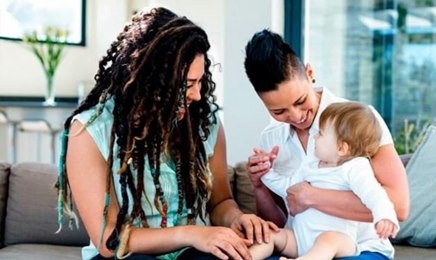
Following the legalization of equal marriage, Costa Rica now offers same-sex couples the opportunity for joint adoption and guarantees the rights of children from homo-parental families.
On May 26th, a historical milestone was marked in Costa Rica: the legal recognition of equal marriage, thus becoming the first country in Central America to officially accept same-sex marriage and the twenty-ninth (29) worldwide.
‘’Today we celebrate freedom, equality and democratic institutions. Let empathy and love be the compass that allows us to get ahead and build a country where all people are included,’’President Carlos Alvarado Quesada announced at the time.

This significant step has represented not only a valuable achievement in the fight for equality and respect for the LGBT community, but it has also brought with it the recognition of the rights of homoparental and diverse families, who were legally unprotected for years.
In Costa Rica, citizens have had the possibility of adopting children, regardless of their sexual orientation. However, joint adoption by same-sex couples was legally prohibited until May of this year.
By being excluded from the recognition of their family identity, minors were left helpless before the law in the event of the death of one of the parents or separation of the spouses. However, as of May 26th, the children of homoparental and diverse families fully enjoy their rights.
Therefore, same-sex couples can now initiate adoption procedures under the same regulations established in Article 100 of the Family Code and in the Regulations for the National and International Adoption Processes of the National Board of Children of Costa Rica. .
In an international interview, Jorge Urbina Soto, coordinator of the Adoption Department of PANI, assured that the processes for evaluating families to determine their suitability for adoptive purposes fines are totally inclusive.
Urbina explained that the development of this procedure in the Adoption Department is the same as that of a heterosexual couple, where the processes of suitability assessment “do not undergo major changes, neither at the procedural nor substantive level” as they respond to Comprehensive psycho-legal assessments.
Its main objective is: ”to determine in a professional technical way, the existence of suitable motivations, capacities and competences of a protective and attentive nature in the applicants, in order to guarantee that they will be able to assume their sons and daughters profile the best manner possible”.
Likewise, Urbina emphasized that “the interest of PANI’s technical assessment and selection processes is to guarantee children and adolescents who require a family placement that they will be placed under the protection of the best potentially adoptive family, that they can be provided with, in terms of their care, containment and support in all areas of development”.
For these reasons, the Adoption Department contemplates 12 points within the official adoption process, which include consulting, informative and reflective workshops, psychosocial evaluations, compatibility process, post-placement support and professional technical support.
Regarding the time it takes for the entire adoption process, Urbina explained that between the formal presentation of the application and declaration of suitability, it is taking around 7 or 8 months if they provide private evaluations and about 1 year and 4 months if the evaluations are carried out in full at the Adoption Department. ”

Regarding the order of last names in the children of homoparental couples, Urbina said that the issue has not yet been legally resolved, but noted that recently the Supreme Electoral Tribunal ruled on the issue in the following terms:
To allow same-sex parents couples to choose the order of last names their children will bring. By following our legal regulation on the order of surnames with which a minor is registered, a traditional, binary logic does not provide for a homo-parental composition of parents.
That question was resolved by the Tribunal, establishing that when there is no adoption process (in which case the order will be determined by the administrative act or sentence that approves it), the parents will be able to select which surname will go first. Once elected, it cannot be changed for future children of that same union.

